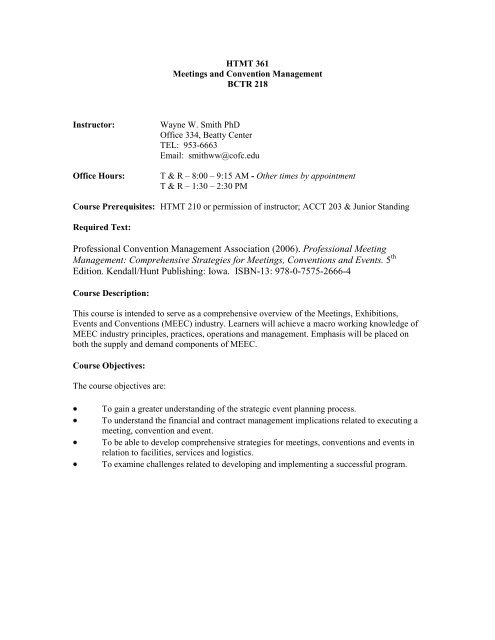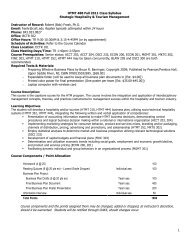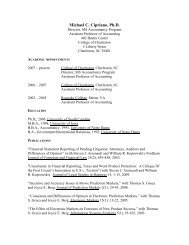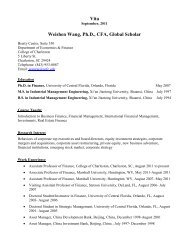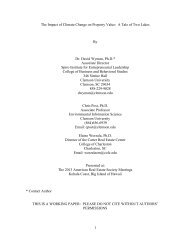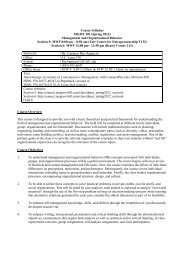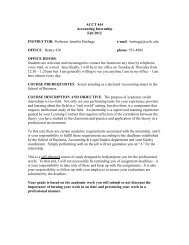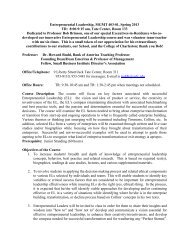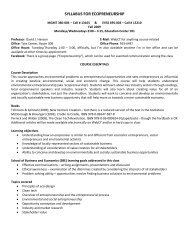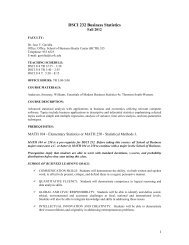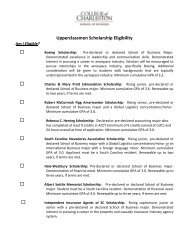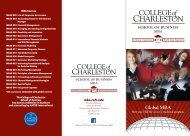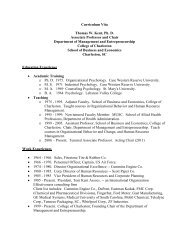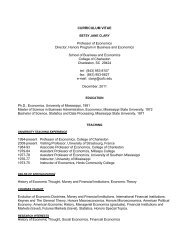HTMT 361 Dr. Wayne Smith - School of Business - College of ...
HTMT 361 Dr. Wayne Smith - School of Business - College of ...
HTMT 361 Dr. Wayne Smith - School of Business - College of ...
Create successful ePaper yourself
Turn your PDF publications into a flip-book with our unique Google optimized e-Paper software.
<strong>HTMT</strong> <strong>361</strong><br />
Meetings and Convention Management<br />
BCTR 218<br />
Instructor: <strong>Wayne</strong> W. <strong>Smith</strong> PhD<br />
Office 334, Beatty Center<br />
TEL: 953-6663<br />
Email: smithww@c<strong>of</strong>c.edu<br />
Office Hours: T & R – 8:00 – 9:15 AM - Other times by appointment<br />
T & R – 1:30 – 2:30 PM<br />
Course Prerequisites: <strong>HTMT</strong> 210 or permission <strong>of</strong> instructor; ACCT 203 & Junior Standing<br />
Required Text:<br />
Pr<strong>of</strong>essional Convention Management Association (2006). Pr<strong>of</strong>essional Meeting<br />
Management: Comprehensive Strategies for Meetings, Conventions and Events. 5 th<br />
Edition. Kendall/Hunt Publishing: Iowa. ISBN-13: 978-0-7575-2666-4<br />
Course Description:<br />
This course is intended to serve as a comprehensive overview <strong>of</strong> the Meetings, Exhibitions,<br />
Events and Conventions (MEEC) industry. Learners will achieve a macro working knowledge <strong>of</strong><br />
MEEC industry principles, practices, operations and management. Emphasis will be placed on<br />
both the supply and demand components <strong>of</strong> MEEC.<br />
Course Objectives:<br />
The course objectives are:<br />
To gain a greater understanding <strong>of</strong> the strategic event planning process.<br />
To understand the financial and contract management implications related to executing a<br />
meeting, convention and event.<br />
To be able to develop comprehensive strategies for meetings, conventions and events in<br />
relation to facilities, services and logistics.<br />
To examine challenges related to developing and implementing a successful program.
SBE Learning Goals:<br />
The SBE learning goals are:<br />
Effective Communications: Students will write pr<strong>of</strong>essional documents that are<br />
technically correct and concise and make effective presentations utilizing technological<br />
tools and ability utilizing relevant discipline specific knowledge.<br />
Ethical Awareness: Students will recognize and be able to appraise ethical dilemmas<br />
involved in business decisions and competently engage in discourse aimed at resolution<br />
<strong>of</strong> these dilemmas utilizing relevant discipline specific knowledge.<br />
Global Awareness: Students will recognize and examine the global implications <strong>of</strong><br />
business decisions while evaluating and integrating innovative applications <strong>of</strong> these<br />
implications utilizing relevant discipline specific knowledge.<br />
Problem Solving Ability: Students will demonstrate critical thinking skills in identifying<br />
and evaluating problems and opportunities in the business environment and apply<br />
analytical techniques to formulate creative solutions utilizing relevant discipline specific<br />
knowledge.<br />
Pr<strong>of</strong>essor’s Policies<br />
Please come see the pr<strong>of</strong>essor if you need help with the course materials.<br />
o If the <strong>of</strong>fice door is open, please feel free to knock and enter (unless someone<br />
else besides me is already in the <strong>of</strong>fice).<br />
o If you want a specific time to meet outside <strong>of</strong> <strong>of</strong>fice hours, please make an<br />
appointment via Email.<br />
Please use your school Email account for all electronic correspondence with the pr<strong>of</strong>essor<br />
& industry clients.<br />
o When Emailing please put the course number in the subject line and remember to<br />
check your grammar and spelling.<br />
o The pr<strong>of</strong>essor tries to respond to all correspondence within 24 hours however;<br />
sometimes circumstances do arise when that is not possible. If you have not<br />
received a reply in 24 hours, please resend the Email with a reminder.<br />
All assignments are due at the beginning <strong>of</strong> class in which they are due.<br />
o All assignments collected after that time are considered late and a 25% per day<br />
penalty will be assessed unless prior arrangements between the student and the<br />
pr<strong>of</strong>essor were made.<br />
o All assignments must be handed directly to the pr<strong>of</strong>essor. DO NOT slide<br />
assignments under the pr<strong>of</strong>essor’s <strong>of</strong>fice door!<br />
Please note that extra credit assignments will not be given.<br />
When receiving a grade, wait 24 hours before disputing it if necessary.<br />
o If it is an adding error, it can be corrected immediately however, if it is a<br />
substance issue, please wait 24 hours and make an appointment to discuss the<br />
grade with the pr<strong>of</strong>essor.
<strong>College</strong> <strong>of</strong> Charleston Honor Code and Academic Integrity<br />
Lying, cheating, attempted cheating, and plagiarism are violations <strong>of</strong> our Honor Code that, when<br />
identified, are investigated. Each incident will be examined to determine the degree <strong>of</strong> deception<br />
involved.<br />
Incidents where the instructor determines the student’s actions are clearly related more to a<br />
misunderstanding will handled by the instructor. A written intervention designed to help prevent<br />
the student from repeating the error will be given to the student. The intervention, submitted by<br />
form and signed by both the instructor and the student, will be forwarded to the Dean <strong>of</strong> Students<br />
and placed in the student’s file.<br />
Cases <strong>of</strong> suspected academic dishonesty will be reported directly by the instructor and/or others<br />
having knowledge <strong>of</strong> the incident to the Dean <strong>of</strong> Students. A student found responsible by the<br />
Honor Board for academic dishonesty will receive a XF in the course, indicating failure <strong>of</strong> the<br />
course due to academic dishonesty. This grade will appear on the student’s transcript for two<br />
years after which the student may petition for the X to be expunged. The student may also be<br />
placed on disciplinary probation, suspended (temporary removal) or expelled (permanent<br />
removal) from the <strong>College</strong> by the Honor Board.<br />
Students should be aware that unauthorized collaboration--working together without permission--<br />
is a form <strong>of</strong> cheating. Unless the instructor specifies that students can work together on an<br />
assignment, quiz and/or test, no collaboration during the completion <strong>of</strong> the assignment is<br />
permitted. Other forms <strong>of</strong> cheating include possessing or using an unauthorized study aid (which<br />
could include accessing information stored on a cell phone), copying from others’ exams,<br />
fabricating data, and giving unauthorized assistance.<br />
Research conducted and/or papers written for other classes cannot be used in whole or in part for<br />
any assignment in this class without obtaining prior permission from the instructor.<br />
Students can find the complete Honor Code and all related processes in the Student Handbook at<br />
http://www.c<strong>of</strong>c.edu/studentaffairs/general_info/studenthandbook.html.<br />
Disability Statement<br />
This <strong>College</strong> abides by section 504 <strong>of</strong> the Rehabilitation Act <strong>of</strong> 1973 and the Americans with<br />
Disabilities Act that stipulates no student shall be denied access to an education “solely by reason<br />
<strong>of</strong> a handicap.” Disabilities covered by law include, but are not limited to, learning disabilities<br />
and hearing, sight or mobility impairments. If you have a documented disability that may have<br />
some impact on your work in this class and for which you may require accommodations, please<br />
see an administrator at the Center <strong>of</strong> Disability Services, (843) 953-1431 or me so that such<br />
accommodation may be arranged.
Grading Grades<br />
Class Assignments 25<br />
Final Exam 35<br />
Major Project 40<br />
TOTAL 100<br />
Grading<br />
A 94 - 100<br />
A- 90 – 93<br />
B+ 87 – 89<br />
B 83 – 86<br />
B - 80 – 82<br />
C+ 77 – 79<br />
Class Assignments (25%)<br />
C 73 – 76<br />
C- 70 – 72<br />
D+ 67 – 69<br />
D 63 – 66<br />
D - 60 – 62<br />
At certain periods during the course assignments will be distributed. These assignments will<br />
correspond to the lecture materials, readings and provides a hands-on learning experience critical<br />
to engaging the course materials. In order to receive a grade for an assignment, you must be<br />
present in class when the assignment is distributed and when it is due to be handed in. If you<br />
miss an assignment for a legitimate reason (illness, serious family matters etc.), you must come<br />
see the instructor during <strong>of</strong>fice hours to discuss the possibility <strong>of</strong> making up the grade. You may<br />
only make up one missed in class assignment per term with the exception <strong>of</strong> extreme<br />
circumstances as judged by the pr<strong>of</strong>essor.<br />
Major Project (40%)<br />
You will represent and develop an answer to three RFPs’ as if you were working as a<br />
representative <strong>of</strong> the property. You will be graded on your rationales for your choices, the<br />
pr<strong>of</strong>essionalism <strong>of</strong> the answers and the ability to develop a compelling sales document. More<br />
details related to the project will be disseminated in class.<br />
Final Exam (35%)<br />
You will be tested on course content and readings and guest lecture materials in a final exam.<br />
It is the student’s responsibility to be available to take examinations during the scheduled<br />
times.
CLASS TOPICS<br />
(Subject to Change upon Instructor’s Discretion)<br />
1. Introducing Meetings and Convention Management<br />
2. Selling Destinations<br />
a. PMM Chapters - 11 & 12<br />
3. RFP Process<br />
a. Project Assigned<br />
b. PMM Chapter - 46<br />
c. September 7 th – Meet with Tracy Mitchell – Director <strong>of</strong> Sales and Marketing @<br />
the Charleston Harbor Resort & Marina - *please be in business casual dress<br />
4. Site Selection Process<br />
a. PMM Chapters - 11, 12, 14 15, & 16<br />
b. September 12 th – Meet with Jeanne Jamme – Sales Director PGA Corporate Sales<br />
– Kiawah Island Golf Resort Clubhouse<br />
i. <strong>Dr</strong>ess business casual & class begins at 6:00 PM.<br />
5. Budgeting & Contract Negotiations (Wild Dunes)<br />
a. PMM Chapters - 3, 40, 41 & 42<br />
b. September 21 st – Meet with Jody Harris – Sales Director Wild Dunes Resort –<br />
Wild Dunes Resort – Sweetgrasss Pavilion<br />
i. <strong>Dr</strong>ess business casual & class begins at 6:00 PM.<br />
6. Preparing Comprehensive Timeline (Project Plan) for Meeting (Event)<br />
a. PMM Chapters - 19, 34<br />
b. September 26 th – Meet with Jenna DiForio Catering Sales Manager & Suite<br />
Concierge @ North Charleston Coliseum, Convention & Performing Arts Center<br />
i. <strong>Dr</strong>ess business casual & class begins at 6:00 PM.<br />
7. Identify successful criteria for evaluation <strong>of</strong> meeting (event)<br />
a. PMM Chapters - 45 & 46<br />
b. Presentations <strong>of</strong> RFPs – TBD - October 3 rd or 5 th .<br />
8. Final Exam


